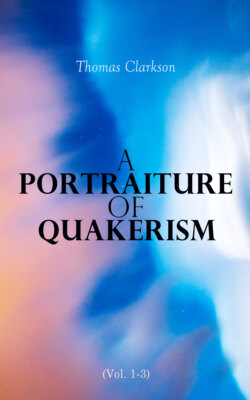Читать книгу A Portraiture of Quakerism (Vol. 1-3) - Thomas Clarkson - Страница 12
На сайте Литреса книга снята с продажи.
SECT. IV.
ОглавлениеAnother cause of their prohibition is, that, if indulged in, they may produce habits of gaming—these habits after the moral character-they occasion men to become avaricious—dishonest—cruel—and disturbers of the order of nature—observations by Hartley from his essay on man.
Another reason, why the Quakers do not allow their members the use of cards, and of similar amusements, is, that, if indulged in, they may produce habits of gaming, which, if once formed, generally ruin the moral character.
It is in the nature of cards, that chance should have the greatest share in the production of victory, and there is, as I have observed before, usually a monied stake. But where chance is concerned, neither victory nor defeat can be equally distributed among the combatants. If a person wins, he feels himself urged to proceed. The amusement also points out to him the possibility of a sudden acquisition of fortune without the application of industry. If he loses, he does not despair. He still perseveres in the contest, for the amusement points out to him the possibility of repairing his loss. In short, there is no end of hope upon these occasions. It is always hovering about during the contest. Cards, therefore, and amusements of the same nature, by holding up prospects of pecuniary acquisitions on the one hand, and of repairing losses, that may arise on any occasion, on the other, have a direct tendency to produce habits of gaming.
Now the Quakers consider these habits as, of all others, the most pernicious; for they usually change the disposition of a man, and ruin his moral character.
From generous-hearted they make him avaricious. The covetousness too, which they introduce as it were into his nature, is of a kind, that is more than ordinarily injurious. It brings disease upon the body, as it brings corruption upon the mind. Habitual gamesters regard neither their own health, nor their own personal convenience, but will sit up night after night, though under bodily indisposition, at play, if they can only grasp the object of their pursuit.
From a just and equitable they often render him a dishonest person. Professed gamesters, it is well known, lie in wait for the young, the ignorant, and the unwary: and they do not hesitate to adopt fraudulent practices to secure them as their prey. In toxication has been also frequently resorted to for the same purpose.
From humane and merciful they change him into hard hearted and barbarous. Habitual gamesters have compassion foe neither men nor brutes. The former they can ruin and leave destitute, without the sympathy of a tear. The latter they can oppress to death, calculating the various powers of their declining strength, and their capability of enduring pain.
They convert him from an orderly to a disorderly being, and to a disturber of the order of the universe. Professed gamesters sacrifice every thing, without distinction, to their wants, not caring if the order of nature, or if the very ends of creation, be reversed. They turn day into night, and night into day. They force animated nature into situations for which it was never destined. They lay their hands upon things innocent and useful, and make them noxious. They by hold of things barbarous, and render them still more barbarous by their pollutions.
Hartley, in his essay upon man, has the following observation upon gaming.
"The practice of playing at games of chance and skill is one of the principal amusements of life. And it may be thought hard to condemn it as absolutely unlawful, since there are particular cases of persons, infirm in body and mind, where it seems requisite to draw them out of themselves by a variety of ideas and ends in view, which gently engage the attention.—But the reason takes place in very few instances.—The general motives to play are avarice, joined with a fraudulent intention explicit or implicit, ostentation of skill, and spleen, through the want of some serious, useful occupation. And as this practice arises from such corrupt sources, so it has a tendency to increase them; and indeed may be considered as an express method of begetting and inculcating self-interest, ill will, envy, and the like. For by gaming a man learns to pursue his own interest solely and explicitly, and to rejoice at the loss of others, as his own gain, grieve at their gain, as his own loss, thus entirely reversing the order established by providence for social creatures."
